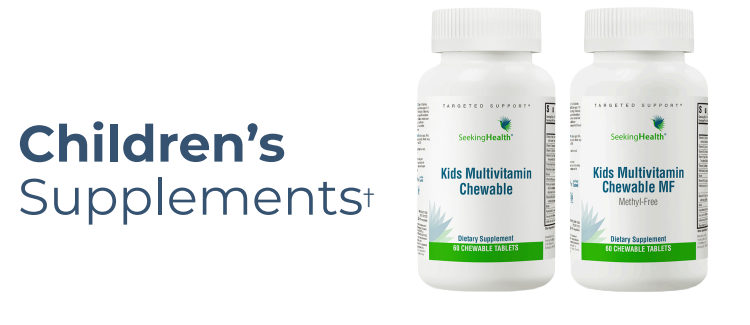It’s normal to want the best for your children. Supplements are a major part of wellness routines for many adults. Should they be included in your child’s nutrition plan?
If so, how? As a supplement company, we are frequently asked about children’s supplements. Can children take adult supplements? What do we recommend? We can’t answer these questions in the context of personal advice, but here’s how we can help. This post explores common questions about children’s supplements, who to ask for help, and basic questions about our products for kids.
Do Kids Need Supplements?

If you want to know whether kids need supplements to be healthy, the answer is no. But also, it depends! This is because the only person who can truly answer this question is your healthcare provider. We’ll get into this more below, but nutrient RDAs are based on a majority of the population who is presupposed to be healthy.
The American Academy of Pediatrics does not routinely recommend kids vitamins for children who eat a healthy diet. These include foods like whole grains, dairy products, citrus fruits, and a variety of foods essential for a balanced diet. They do recommend vitamin D supplementation for children of all ages. Vitamin D supplements should include 400 IU for infants age one and under, and 600 IU for children over age one. Getting enough vitamin D from foods can be very difficult. You or your child may need higher nutrient intakes for several reasons. These could include: (1, 2, 3)†
- Having medical conditions or disorders
- Being over or under weight
- Having digestive or gastrointestinal issues that hinder absorption
- Having allergies that necessitate a highly restrictive diet
- Being a picky eater or struggling to eat whole foods
- Following a restricted food plan like a vegan diet
- Having nutritional deficits, like iron deficiency (which can be common)
It’s important to work with a nutrition or medical professional if you plan to have your child consume higher amounts of nutrients. This is because the body requires nutrients to be in the correct ratio to each other. Taking higher amounts of some mineral supplements, for example, could displace other minerals. More is not always better. The body is in a constant state of trying to maintain homeostasis or balance. Taking extra supplements without a specific reason or strategy could disrupt this essential state of balance. Overall, ensuring that your child gets enough healthy foods from all food groups is important for normal growth.
Your pediatrician can advise whether your child’s diet is meeting their needs. While all nutrients are important, there is a special focus on certain nutrients during rapid growth periods. Strong bones require calcium and vitamin D. Your child needs essential vitamins for a healthy immune system, brain development, heart health, and more.†
Children’s dietary supplements can come in many forms, including gummy, chewable, powders, and capsules. The form isn’t as important as the nutrients contained in them. However, be cautious of added sweeteners (sugar), fillers, preservatives, artificial colors, and artificial flavors. Many kids multivitamin gummies and some chewable tablets contain undesirable ingredients.
Serving Sizes: %DV, RDA and AI Explained

When you read supplement labels, you see a serving size. You will also see specific nutrients listed with their amounts. Next to the amounts, you’ll see many vitamins and minerals listed with a percentage under a column labeled “%DV.” This stands for “percent daily value.” It represents how much of each ingredient per serving contributes to the daily requirements—based on a 2,000 calorie diet in healthy adults. Obviously, a four year old, adolescents in their teens, and adults who are in their sixties are all going to consume different nutrient intakes, just an example. Children and adults facing medical or other challenges may also have different needs. The %DV (percent daily value) applies to anyone ages four and older, so it’s a bit of an arbitrary number. But it does provide a baseline comparison. This is where it’s beneficial to communicate with your child’s healthcare provider to determine the serving sizes that they need for individual nutrients. They may even share their preferred brand of children’s multivitamin with you upon request.
Because the %DV applies to anyone age four and older, it can be misleading. Ask your child’s healthcare provider for specific serving sizes based on their age and weight.
There is not a %DV established for every supplement ingredient. The %DV is usually only calculated for vitamins and minerals. They are based on FDA calculations using the RDA (Recommended Dietary Allowance) or the AI (Adequate Intake). (4)
- The RDA (Recommended Dietary Allowance) is the average amount of a nutrient that is needed by healthy people on a daily basis. RDAs are specific to age, sex, and stage of life. For example, pregnant or breastfeeding women often have a higher RDA for specific nutrients versus other non-pregnant females of the same age. Teenage males may have higher RDAs for certain nutrients than females of the same age. RDAs are developed and updated by the Food and Nutrition Board at the Institute of Medicine of the National Academies.
- The AI (Adequate Intake) is the suggested daily intake of a nutrient that will meet or exceed that amount needed to maintain adequate nutritional status. The AI is determined when there is not enough evidence or research to determine the RDA of a particular nutrient.
Why are Some %DV Really High?

Sometimes supplements will include %DV that are really high. Our Kids Multivitamin Chewable, as an example, contains vitamin B12 at 833%DV for children 4 years and older. Why so high? There are many reasons why nutrients may appear as higher or lower %DV in supplement formulations. These may include:
- The nutrient is water-soluble, and consuming a higher amount is less likely to result in toxicity
- The nutrient tends to have more trouble absorbing at optimal rates, so the formulation compensates for this by increasing the %DV
- The nutrient is known to be consumed inadequately by the supplement’s target population
- The nutrient is included at a specific percentage to keep it in balance with other nutrients in the formulation
Ultimately, the %DV can be used as a guide, but is not specific to you or your child. Only your healthcare provider can determine the specific nutrient intake amount that is best for your circumstances and needs.
The percent daily value (%DV) is based on the serving size. It shows how much each ingredient contributes to the daily nutrition requirements for healthy adults—based on a 2,000 calorie/day diet.
Can Children Take Adult Supplements?

Many people want to know: can children take adult supplements? What features distinguish a kids multivitamin or a supplement intended for children?
If a supplement isn’t explicitly labeled for infants or children, it is likely based off of the RDA for healthy people ages four and older. But that does not mean that all four-year-olds can or should take any adult supplement. It also doesn’t mean that anything labeled for children is automatically safe for your two, three, or four-year-old.
Children’s supplements typically contain different nutrient amounts than those designed for adults. However, reading labels and doing side-by-side comparisons (or asking your physician) are the only real ways to confirm whether a product designed for children has different nutrient levels, and which ones. There are limits to what the FDA regulates in the dietary supplement industry. They do not vet individual supplements for safety.
The FDA regulates the manufacturing, labeling, and marketing of dietary supplement products. However, you should never assume that any supplement marketed for children automatically means it has safe or proper nutrient levels for your child. Here at Seeking Health, we rigorously test our products to assure purity and potency. We are careful not to make health recommendations per FDA regulations. However, not every supplement company will follow the same internal rules or procedures. The only person truly qualified to help you determine what’s best for your child is a qualified healthcare provider or pediatric nutritionist.
Many people assume that supplements are safe, but that doesn’t mean more is always better. Dr. Ben Lynch, founder of Seeking Health supplements, is a fan of the pulse method for a reason. This is because you can get too much of a good thing!†
Some physicians may recommend adult-formulated supplements for children, based on nutrients contained in them. They may also suggest prenatal vitamins for people who aren’t pregnant, or children’s vitamins for adults. Supplement companies create nutritional formulations but aren’t legally able to tell you which product will meet your needs. You may not need a prescription to get a supplement, but that doesn’t mean it should be a free-for-all. Consult a professional to ensure you’re making the right decision for your child’s nutritional needs.
Seeking Health’s Kids Formulas

Seeking Health only makes two products that are specifically designed for children. Keep in mind, however, that your doctor can choose from any of our formulations to recommend for children age four and older. That’s because your doctor will take into consideration what your child or teen needs, and make dosage recommendations based on their age and requirements.
Our children’s supplement formulations include Kids Multivitamin Chewable and Kids Multivitamin Chewable MF.
Kids Multivitamin Chewable
Intended for children ages 1 and up, Kids Multivitamin Chewable can also be taken by adults. This product is ideal for those who struggle to swallow capsules.†
For children ages 1-3 years, the suggested use is 1 tablet. For children ages 4 years and above, the suggested use is 1-2 tablets. Adults can take a smaller serving size, too. Dr. Ben Lynch recommends the pulse method for multivitamin supplements. It involves listening to your body’s needs and supplementing as needed, and not necessarily taking the same amount every day. When first starting this product, start with a smaller dose and slowly increase over time if you feel it is needed.†
Kids Multivitamin Chewable MF
This product is intended for children ages 1 and up who are sensitive to methylated nutrients like L-methylfolate and methylcobalamin. Kids Multivitamin Chewable MF still contains these essential nutrients, just in the non-methylated forms of hydroxocobalamin and folinic acid. How do you know if your kid is methyl-sensitive? If the consumption of methylated nutrients like the ones mentioned above result in side effects like headaches or nervousness.
Why Can't We Give You Supplement Advice?
While we know it’s not always helpful, we aren’t able to give you personalized advice because:
- The FDA prohibits supplement companies from giving medical advice
- We are not your healthcare provider
- We don’t have access to your health history
Ultimately, the %DV can be used as a guide, but is not specific to you or your child. Only your healthcare provider can determine the specific nutrient intake amount that is best for your circumstances and needs. It’s always better to get customized recommendations, and Dr. Ben Lynch agrees. The entire premise of Dirty Genes is based on yours (and your child’s) genetic individuality. Your genes aren’t written in stone, and your nutritional recommendations can’t be one-size-fits-all.
The Bottom Line

When it comes to supplements for kids, there are many options. The age, stage, and unique needs of your child will influence the type of supplement that may benefit them, as well as the serving size needed. Only your child’s healthcare provider can answer this question with certainty. Be sure to do your homework and read labels. Your little ones are counting on you doing your homework too!













